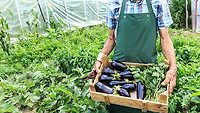Wegmans Food Markets — a Rochester, NY-based supermarket chain with 82 stores located throughout the Northeast — announced this week that effective September 30, the chain will require all growers that furnish fresh produce to Wegmans to show they’ve passed a “Good Agricultural Practices” (GAPs) inspection.
Wegmans actually began phasing in this requirement in 2008, first for growers of crops thought to be high-risk, such as spinach or melons that had been linked to past outbreaks of illness. Over the next several years, Wegmans expanded the requirement to apply to more kinds of fresh produce, and alerted farmers that the company would eventually require all of its produce partners to pass a GAPs audit.
Leading up to this requirement by Wegmans, the company began hosting food safety education training sessions for growers in 2005, and several hundred growers to date have participated in these programs. “The good news is that nearly all of the growers we work with have already passed a GAPs audit,” said Bill Pool, food safety manager for produce at Wegmans, “and if a grower misses this deadline, we’ll look at reinstatement after they’ve passed an inspection.”
The GAPs movement in this country arose in response to growing public concern about outbreaks of illness linked to crops often consumed raw such as spinach, tomatoes, lettuce, melons, and green onions. In 1998, the U.S. Food and Drug Administration (FDA) published recommendations to growers regarding water quality used in irrigating and harvesting crops, how manure is handled, worker hygiene, and the importance of a written food-safety plan. The recommendations were designed to lower the risk of microbial contamination incidents leading to foodborne illness outbreaks.
By 2002, the U.S. Department of Agriculture (USDA) had designed a voluntary audit system that pinpointed key food safety issues for growers and gave them a way to verify that best practices were in place at their farm. Trained auditors personally inspect the farms.
Though voluntary, the audits are rooted in science-based principles of food safety, and have been adopted quickly in North America. In 2012, the USDA Audit Program performed more than 3,000 audits in 46 states, Canada, and Chile, according to the USDA’s Agricultural Marketing Service website.
“These audits are the best way we have to know that a grower is following practices to minimize the chance of pathogens getting into the food supply,” Pool explained. “We all want to keep earning our customers’ trust in the safety of the fresh foods we offer.”
Most of the larger growers Wegmans deals with completed audits soon after they became available, Pool said. “Some of the smaller local growers we work with didn’t have the same resources, so it took them longer. We’ve partnered with research universities and held training sessions to help educate smaller growers," he noted. "Food safety concerns apply to farms of all sizes, and it doesn’t really matter if the farm is conventional or organic. The FDA Food Safety Modernization Act has an exemption for small farms, but we believe that rigorous food safety standards should apply to all farms we work with.”
Wegmans hosted day-long education sessions, inviting the growers and picking up costs for training, materials, and food. “We got the growers and the extension educators in the same room at the same time,” Pool said. The training materials helped growers understand the food safety issues behind the GAPs recommendations, and how to get ready for an audit. Wegmans has also reimbursed small growers $400 to help offset costs associated with a completed and verified audit, a policy the company reviews annually.
The training sessions have been offered regularly during the off-season in states where Wegmans stores are found, and Pool expects that the company will continue offering such opportunities in the future. “We’re a growing company, and as we expand, we want all of the growers we deal with to be on board with rigorous standards,” he said.


